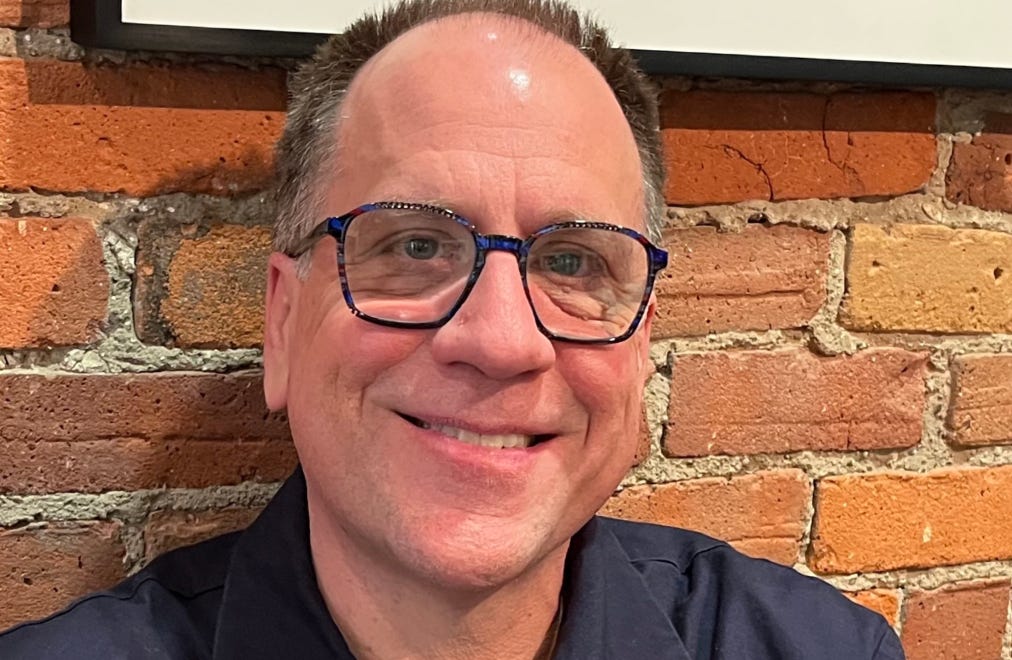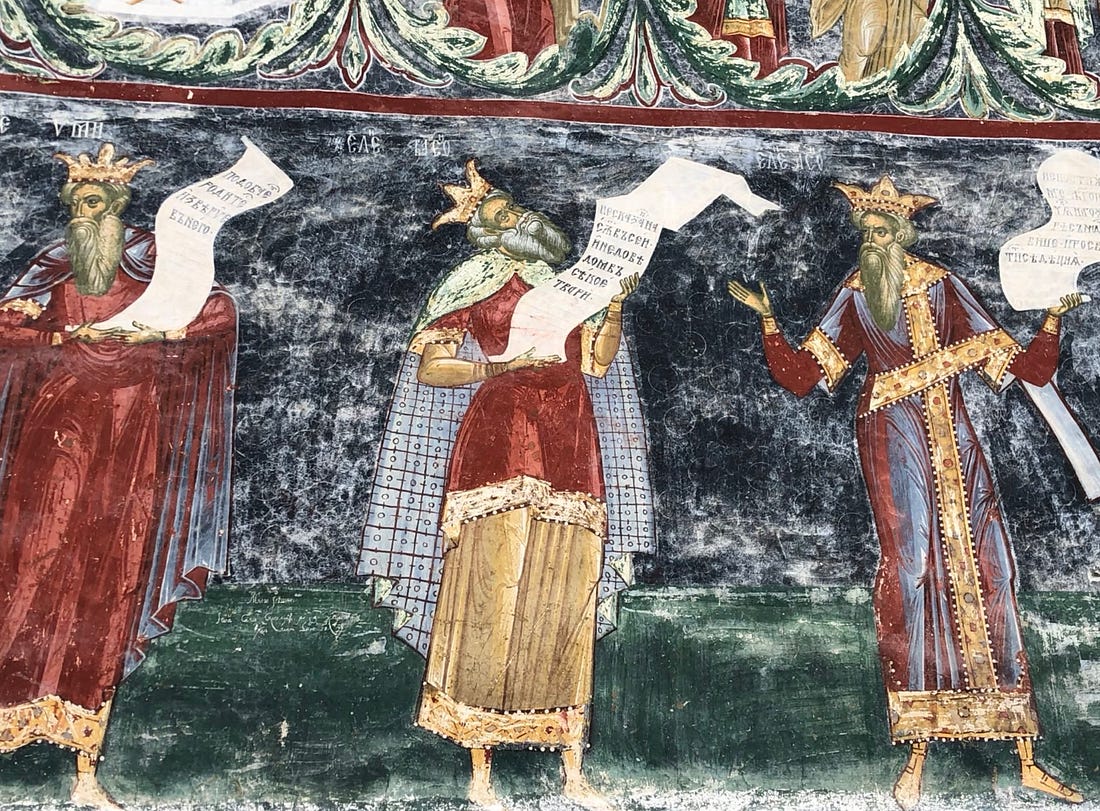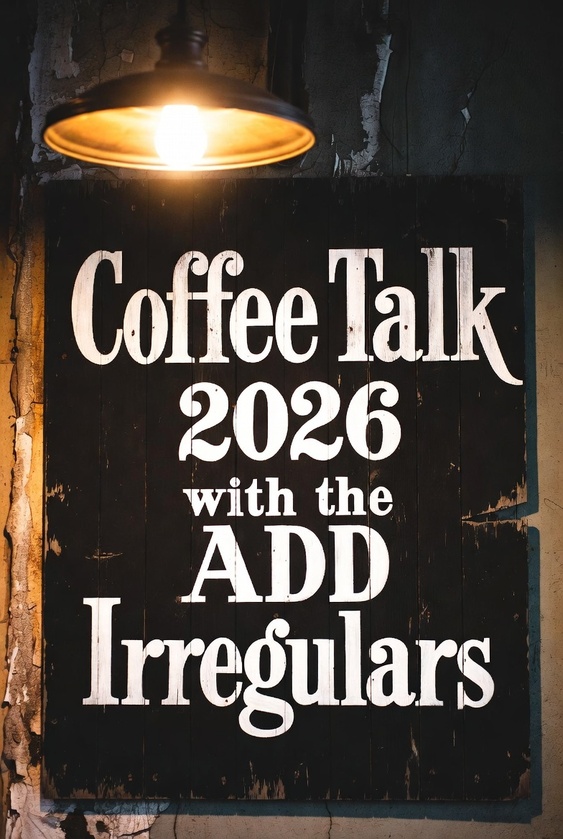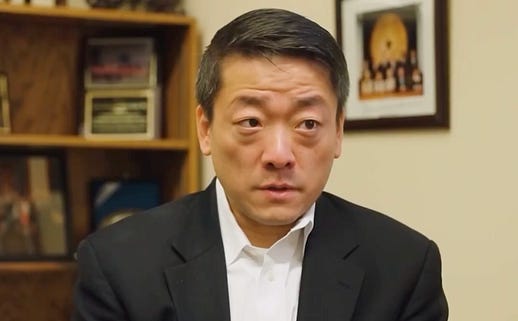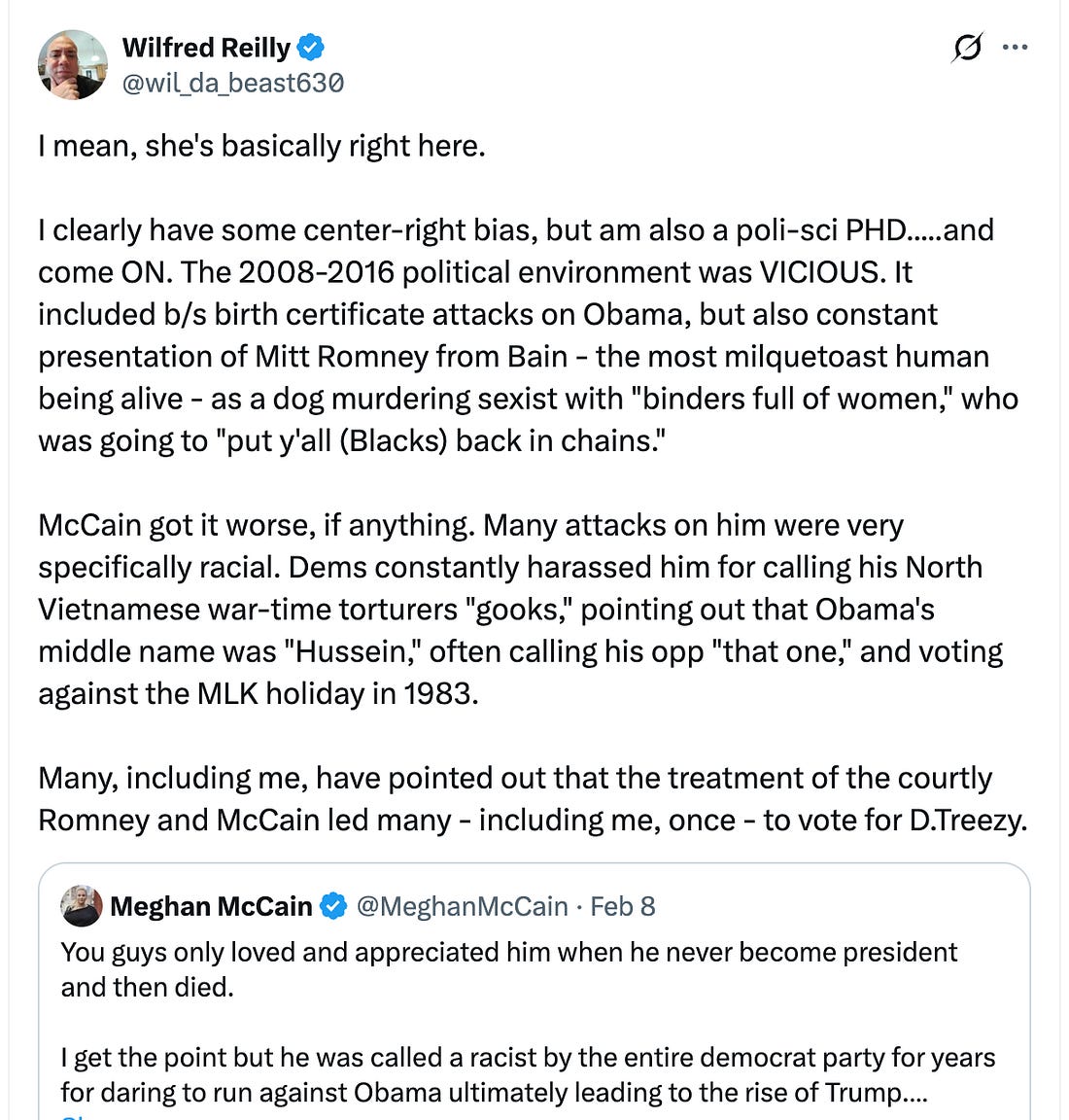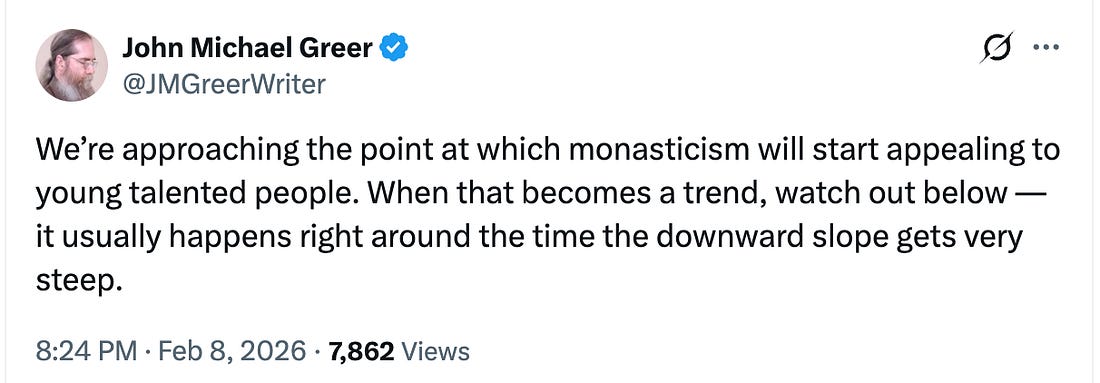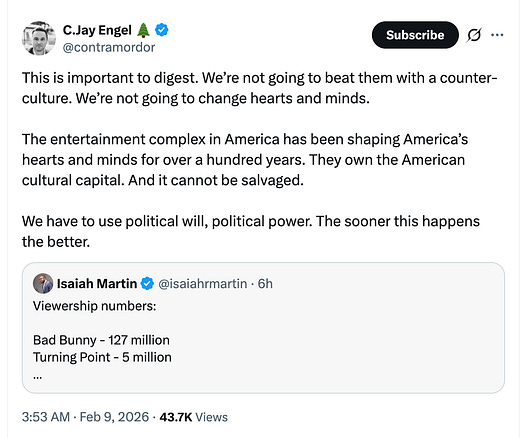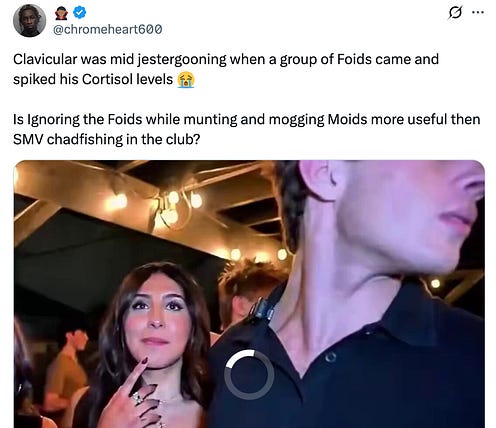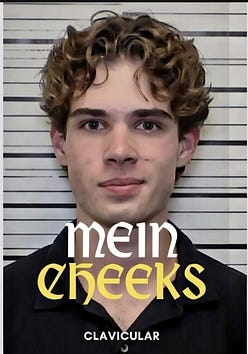 |
John Vervaeke & The Meaning Crisis
What I'm Learning From Engaging The Thought Of The Cognitive Scientist
|
I’m in Germany at a conference. On the plane here, I started reading a terrific book, Awakening From The Meaning Crisis, by John Vervaeke and Christopher Mastropietro. I’ve been wanting for a long time to get into Vervaeke (pron. “ver-VAY-kee”), a University of Toronto cognitive scientist who is part of Jordan Peterson World, but I just don’t have time to listen to podcasts, which is how he presents most of his public work.
If you do, here’s a treasure trove: a link to video presentations of Vervaeke’s lectures on the Meaning Crisis. The book I bought seems to be a distillation of the first twenty-five episodes (a second volume is coming). Vervaeke is not a Christian, by the way. He is interested in Buddhism, not as a religion, it seems, but as an approach to cognition. His work is filled with useful insights — so much so that I don’t think I’ll be able to wait for the final book, presenting his Meaning Crisis lectures in written form (the form in which I best learn). Looks like I have my next thing to listen to on my daily walks. Here’s what I’m getting from the book so far:
The Meaning Crisis, in Vervaeke’s view, amounts to this:
… the decentering of human life from its cosmic significance, a decline in our sense of purpose, and a sensation of having lost the soul that gave earlier human societies their adaptiveness and vitality. It seems we are left with a feeling of having lost our place in the world along with a sense of who we are and what we ought to do with ourselves.
People today — those without dead souls — are grasping for meaning, trying to find their way out of the dark wood of despair.
There is a pattern to all of these efforts, a certain hunger in the human spirit, a depth of need that has not been fully understood. When we begin to recognize this need as a feature of our spiritual condition, we can begin to piece together a unifying account for why all of this is happening. Each of these movements is responding to a crisis of meaning, a disorienting sense that we have forgotten some essential dimension to reality and lost our relationship to what is good, true, and beautiful. This crisis has deprived us of something essential at the center of our lives. It has been described in many ways by many thoughtful people across time, but we might think of it quite simply as a famine of the spirit, an existential illness that has taken shape in the human brain, body, culture, and soul.
Vervaeke describes the search for meaning as the search for wisdom:
Wisdom is ultimately about how to generate and enhance this meaning. Wisdom is about realizing. This means that cultivating wisdom generates realization in both senses of the word: becoming aware and making real. Wisdom is about realizing meaning in life in a profound way.
Now, here’s where it gets interesting for me. My next book is (broadly) going to be about pilgrimage as a journey for meaning — specifically, a journey to recover God, and, in the narrative I plan, a way of seeing our civilizational inheritance as a material bearer and mediator of meaning and divinity. (Note: not divinity itself — that would be idol-worship — but as a mediator of God’s presence.) Vervaeke:
It may sound high-minded and mystical, but self-transcendence is an essential need for human beings. It performs core functions for our cognition. For instance, deep connections exist between meaning, wisdom and altered states of consciousness (ASC). Throughout our history, human beings have consistently sought ways to alter the quality of our conscious experience by manipulating our physiology and behavior.
Prayer, then — and not just petitions to God, but deeper, more mystical ways of prayer, like the Jesus Prayer in the Orthodox tradition. And pilgrimage: those 20,000 young people walking for sixty miles across the plains of Beauce to Chartres this past June were “praying with their bodies” — seeking to know the Lord through participation in Him.
Vervaeke says a true mystical experience is transformative. After you’ve had one — and you accept it as real — you know you can’t be the same person.
These are awakening experiences, wherein people return from the mystical experience feeling it was somehow more real than reality. They feel a compelling need to change their world and themselves to fit that new reality.
… When people use this word “meaning,” it is a metaphor. They mean that the way life becomes significant is somehow analogous to the way a sentence has semantic meaning. The pieces fit together in some way that impacts our cognition and connects us to the real world.
He goes on:
When words become a sentence, we no longer see the words, but see through them. They become transparent and give us access to participate in reality, allowing us a chance to grasp it, to have contact with it. We have to unpack this metaphor. Why do we use it, and what does it reveal when we talk about the meaning of our lives? How is it that some of the most meaningful experiences people have are precisely the ones that are completely ineffable to them, that they cannot put into words?
For Christians, the material manifestations of the experience of Christ — liturgies, prayers, hymns, church buildings, pilgrimages, and so forth — are metaphors, of a sort. A “metaphor” is an analogy, a kind of bridge. It comes from the Greek word meaning “transference.” The culture we create from our common experience of God serves as a bridge that allows us to have access, however imperfectly, to the “real world” of the divine. It is what allows transcendence — again, imperfectly — to be immanent. Vervaeke says that “metaphor is a way of reaching into the world so it seems to reach back.”
For the cognitive scientist Vervaeke, culture is necessary for knowing:
Your cognition is very participatory; you partake in large, distributed networks of cognition. Before the internet networked computers together, culture networked brains together to provide some of our most powerful problem-solving abilities. This is how human beings responded to an impossible predicament. They formed a social network. These networks were managed with a form of pattern-oriented activity that became so fundamental to human culture that its influence pervades nearly all of our behavior. We call it ritual.
Ritual is guiding your interaction without you noticing. It is the groundwater beneath these cultural forms. If you dig into your own behavior, social or otherwise, you will find it. Even when our interactions seem empty, they continue to convey—and convey us through—these patterns of meaning. In the minutest of gestures, in the smallest of small talk, ancient rituals are at work.
… Ritual trains your ability to regulate your emotion and to undertake a process called decentering: adopting a non-egoic perspective by redirecting your attention to something real outside of you.
It all began in the distant past, with shamans as the bridge between the transcendent and the immanent.
The shamanic integration of flow with altered states of consciousness (ASC), the insight and refinement of intuition, the capacity for metaphorical thought—all of these expanded human cognition by making it much more creative, capable of reading patterns and generating connections between different scales and categories of the world. This allowed our ancestors to gather the world together and unite different parts of experience to create working models of reality as well as the structures that seemed to exist beneath us, around us, and within us. These symbolic unities, or mythologies, gave us a new kind of agency in the world and an idea of who we were within it. This was the beginning of what we would later call a worldview.
You can see where he’s going with this — and where I, the Christian writer with a newfound, post-Chartres interest in the power of Christian culture, am going with this.
“Myth,” as Vervaeke uses it, is not something untrue, but rather a story, a metaphor that allows us to grasp transcendent realities, and order our lives according to those truths. Tolkien famously told C.S. Lewis that Christianity is “the myth that is true.” I believe that, certainly — but the point to take is that myths themselves, even if not true in the most literal sense, are crucial to human cognition and the forming of culture. Without building a sacred canopy (the term is Peter Berger’s) over ourselves and our societies, a canopy woven from myth, we are lost.
The Axial Age (from the 8th to the 3rd centuries, BC) was a period of profound shift in human consciousness, across many different civilizations. It was the period of the Greek philosophers, the Hebrew prophets, and the advent in the Far East of Buddha, Confucius, Lao-tzu, and Zarathustra. This caused what Vervaeke calls the “great disembedding,” in which humanity became conscious of itself as somehow separate from the cosmos. He became aware of a transcendent world beyond this one.
In the great disembedding, one world became two. The everyday world was that of the untrained mind, a world beset by self-deception, self-destruction, illusion, violence, and chaos. To live in this world was to be out of touch with reality. The real world lay behind this world of illusion. This was how the trained mind, the wise mind, saw the world.
In the two-worlds mythology, wisdom is not the acquisition of power or prosperity. It is the emancipation from a lesser reality. The axial hero did not want to conquer the everyday world. He wanted to be transformed out of it.
In the two-worlds mythology, meaning was not just about connectedness as it was in the continuous cosmos but specifically connectedness to the real world. This also changed the idea of the self. In the continuous cosmos, you were defined largely by how you fit into the world. In the two-worlds mythology, you were defined more by self-transcendence, how you transformed and grew as a person.
More:
The two-worlds Mythology is a mythological form of thinking that allows us to articulate and train the psychotechnologies of the Axial Revolution, the projects of self-transcendence and wisdom. It took the meaning-making of the shaman and refined it into a more precise way of cultivating human cognition. However, this mythology is failing us now. The scientific worldview, with its materialist and physicalist metaphysics, is gradually eroding the Axial project.
This is one of the great problems of the Meaning Crisis. Since the shaman, human beings have depended on mythology for meaning-making. It has become inseparable from humanness itself. The Axial worldview still holds up our idea of the sovereign person, the individual who has agency, freedom, and responsibility. However, a mythology must be livable in order to perform its function.
The scientific-materialist worldview makes it impossible for the Axial Age way of thinking — obviously, Christianity is part of this — to be sustained. This, says Vervaeke, is why we are having a Meaning Crisis: being human, as we have understood it for over 2,000 years, requires living by myths that connect us to a world of transcendence that we intuit is really there. The Axial Age way of thinking is deeply embedded in our psyches. But the modern way of thinking denies flat-out that there is anything transcending this world.
In 2015, the formerly Christian writer Damon Linker wrote a powerful essay challenging the complacent optimism of the New Atheists, saying that Nietzsche understood better than them the terror implied by the death of God. Linker wrote:
If atheism is true, it is far from being good news. Learning that we're alone in the universe, that no one hears or answers our prayers, that humanity is entirely the product of random events, that we have no more intrinsic dignity than non-human and even non-animate clumps of matter, that we face certain annihilation in death, that our sufferings are ultimately pointless, that our lives and loves do not at all matter in a larger sense, that those who commit horrific evils and elude human punishment get away with their crimes scot free — all of this (and much more) is utterly tragic.
Back to Vervaeke:
The meaning of a mythology is like an atmosphere, and it gives oxygen to our idea of humanness. This atmospheric property of meaning—symbolized by the shaman’s soulfight—refers to human “spirit,” the idea that something about human beings is not confined to body and world but also extends beyond it.
When this symbolic reality begins to decline, it is like the thinning or pollution of that atmosphere. Our meaning-making is asphyxiated, and we are barred from accessing the spirit of soulflight. Human beings become homeless in the universe, as though the soil from which we have grown meaning, and grown ourselves, is no longer fertile.
As Nietzsche famously observed, if we live only for the next world, and the next world is taken from us, precious little is left for the project of meaning, and the consequences are nihilism and profound self-destruction. We do not want to lose all that we gained through the great disembedding, but how do we live with this legacy when we can no longer inhabit its worldview? To begin answering this question, we must gain a fuller understanding of what this world bequeathed us.
(My next book is going to take up in part that highlighted line.)
Vervaeke continues:
To retrace the steps of the Axial Revolution, I will begin in ancient Israel. It is difficult for many modern people to fathom the scope of influence of the Bible—not just for practicing Jews and Christians but for all who grew up and live in the West. Biblical illiteracy has been steadily rising in tandem with our secularization, and this a thwarting problem for our culture—not because people should be Christians or Jews but because failure to grasp the grammar of the Bible is also the failure to grasp the grammar of your own cognition.
You may well profess to be an atheist and disbelieve the doctrines of these traditions. However, this kind of belief—in other words, the propositional belief—is irrelevant in this context. I am not referring to what you profess but how you think and behave. Defining belief only by creed and proposition is analogous to defining the democratic sensibility by whether or not you cast a ballot on voting day; you still participate, however unconsciously, in the ethics, rituals and institutions that structure this form of society.
… The mythology of the Judeo-Christian heritage, for instance, has become an invisible architecture for our thinking, a meaning we live in, furnish, and refurnish over time. One of the psychotechnological inventions that undergirds this architecture appears so obvious that we do not stop to consider its novelty: the understanding of time as a cosmic narrative, as a story. All cultures tell stories, and we will unpack the cognitive science of story in later chapters.
Yet the Continuous Cosmos [of the pre-Axial Age] was not a story. It was a cycle. The story has a beginning, a crucial turning point that forces a crisis and leads the protagonist to act, and a resolution. There is a direction to a story. There is a purpose to it.
Yes. I believe it was MacIntyre who said that we cannot know what to do until we understand what story in which we are a part. The scientific-materialist worldview denies that there is a story at all. Here, according to Vervaeke, is the breakthrough that came to us through Hebraic monotheism:
As with most historical transitions, the cross-fade from continuous cosmos to Axial mythology was gradual rather than immediate. You can detect many aspects of a Bronze Age god in the Old Testament, but He becomes more Axial as He becomes the force of progress, the idea that history, when directed to its proper course, is moving closer to its purpose, gathering together across time, perfecting and refining, becoming more real.
This gathering is happening on a cosmic scale but also on an individual scale, and God becomes the correspondence between these scales, whose revelations collapse together— like the character and the world of a narrative—when the narrative reaches a pivotal turning point. The turning point of the story is called kairos.
In common parlance, kairos refers to a critical or opportune moment, an opening in time that allows us to see, access or intervene in something that was once invisible or obscure. In the two-worlds mythology, kairos is a revelation of the real world from within the mirage.
Kairos requires a shamanic synonymy of knowing and participating. This synonymy is captured in the idea of Da’ath, an ancient term for knowing, used in the Bible to refer to sexual intercourse (e.g., Adam knew his wife Eve). Modern Westerners may find this confusing; we do not often use sex as a metaphor for knowledge. Yet many cultures do.
Moses receiving the Law on Sinai was a kairos moment. For Christians, the Incarnation was the kairos moment of all kairos moments.
The sexual metaphor is a rich one, and we should not shrink from it out of prudery. When one has sex — or, I should say, unites with someone one loves, as distinct from merely mating like animals — one opens a bridge in the most intimate way possible with another soul. One ceases to be oneself, but unites with another, knows the other through unsurpassably intimate participation in the other, and is changed by it. One might even produce new life from it.
When the Christian scripture calls Christ the Bridegroom and the Church the Bride, this is the way of knowing implied by that metaphor.
Vervaeke:
The identity relationship between knowing and participating is a fundamental Axial idea, and it is central to understanding the religious nature of the ancients and their symbolic way of experiencing the world. “Knowing” is not the apprehension of facts, seen dispassionately from the outside. It is nothing you could acquire from a distance. You know something by assuming its identity, by becoming it. Your becoming it somehow changes it, reveals it, makes it real.
When you are making love with someone, you are participating in them, identifying with them, empathizing and resonating with them. You are changing them as they are changing you, and this process of change rises—forgive me the pun—to a climax, after a turning point and before the resolution. You may begin to see why, in so many religious traditions, sexuality is a perennial symbol for our sacred union with reality. Da’ath describes our participatory knowing in the course of its unfolding.
This idea of knowing is critical for our project because it changes the way we interpret religious ideas of faith and belief. In ancient Israel, faith did not mean having incredible beliefs without evidence. That is a recent, very modern idea. Faith was Da’ath. It described this symbolic relationship you had with the world and with your existence. It was your sense of living in this reciprocal realization.
Do you see the Chartres pilgrimage with different eyes now? Do you see all the various manifestations of Christian culture, beginning with the early Church, and extending through history to our own time, in a different way? You should. The idea that faith is about nothing more than assenting to propositions is a modern one, and one that leads to disenchantment.
In the Orthodox Christian faith, “sin” is understood not as the breaking of the moral law, in a legal sense, but rather more as “missing the mark” — of living in disharmony with what is Really Real. Vervaeke thinks something similar:
This kind of language returns us to the idea of sin, but our biblical illiteracy inhibits us; we are tempted to understand sin as doing something immoral, committing a particular act of transgression. This is much more a symptom than a definition. Sin is better understood as being in a distorted relationship with reality. It is the misdirection of love and attention.
Recall the archery analogy that sources the term’s meaning; you cannot shoot for where your eye tells you to look. If you do, you will miss the bull’s-eye. The true arrow is guided by Da’ath, the kind of knowing that conforms the attention of the archer with the proper target. The archer and her target seem to share the same body, the same identity. Their craft is a movement toward connectedness and participation. When she lands the target, it becomes real to her. She stakes herself in its reality. She is binding herself to the world and the world to herself. One way of understanding sin is as the failure to effect that binding.
In 2022, when I visited the medieval Orthodox monasteries in northern Romania, I noticed at the base of one of the painted churches images of kings. The monk guiding me told me that those are the pre-Christian Greek philosophers who opened the way, conceptually, for Christ.
Vervaeke writes about them at length, saying at one point, “If you were to put Western Civilization on two feet, one foot would be the Bible, and the other would be the works of Plato.” Here’s an excerpt.
Pythagoras’s cosmos anticipated the relationship between beauty, order, and realness that would become essential to the Greek philosophical tradition. When people report awakening experiences, they often rediscover these Pythagorean affinities. They suddenly perceive the world as a cosmos, and their perception of order and coherence is suffused with beauty.
The notion of cosmos created a powerful model for how we understood meaning and wisdom—what a self was, how it perceived and grew, how we fit into the universe, and how we made contact with reality. It draws a striking contrast with the modern worldview.
A cosmos is not the same thing as a universe. A cosmos is a universe suffused with order, pattern, and meaning — with logos. I didn’t fully understand the meaning of the opening of the Gospel of John (“"In the beginning was the Word, and the Word was with God, and the Word was God... And the Word became flesh and dwelt among us."). What does it mean to say that God was the word, and that Jesus of Nazareth was the incarnate Word? Finally someone explained to me that translating the Greek word “logos,” which John used, as “word” is limiting. Yes, “logos” means “word,” but it means far more than that. It means “reason.” It means “ordering principle.” To call God the Logos means that one of His properties is that He is the ordering principle of all of reality. To call Jesus the Logos is to say that the ordering principle of all reality manifested as a man.
Back to Vervaeke’s discussion of Plato:
Notice the role of participatory knowing in the “virtuous circle” above. Contact with reality is dependent on my self-transformation. I am not a passive observer forming true beliefs. I am implicated in my observations. The appearance of the world is a consequence of my framing, and I have to change myself to see the world more clearly. When I do, the world itself seems to change, and it places a demand on me to change myself. As I transform, the world discloses more of itself. This is the dynamic of participatory knowing. It is a reciprocal opening between me and my environment. I am not just changing my mind or knowing with my mind. I am knowing with my whole self, my whole identity, and all the machinery of my cognition.
The related quests for reality, inner harmony, self-knowledge, and transformation are explored deeply in Plato’s Republic. The quest is dramatized in the Myth of the Cave, perhaps the most famous passage in the history of Western philosophy.
I’m running out of the allotted space in this newsletter, so I won’t retell the Myth of the Cave, which most of you no doubt know — but if not, or if you need a refresher, follow the link. More Vervaeke:
Remember: these myths remain popular because they are not stories from the past. They are dramatic recreations of the perennial patterns we face as human beings, like the disharmony we experience in the parts of our psyche, the problem of being trapped in illusion and being out of touch with reality.
In this vision, reason and spirituality are not opposed. They are inseparably bound together. Plato paired the Socratic project (ordering the psyche to overcome self-deception) with the Pythagorean one (the soulflight of self-transcendence and transformation of consciousness). From this marriage, he discovered a way to depict this radical transformation. His depiction is so entrancing that it became a constant refrain throughout the West.
This is why the truest Christianity is a journey towards what we Orthodox call theosis, or unity with God, in which we achieve perfect harmony with Him, while remaining ourselves. Dante writes about this process in the Paradiso. He invented a word, transumanar, to describe the process — but he very much does not mean what Silicon Valley means by transhuman. He means that we become most fully human by becoming transhuman — that is, gradually changed and perfected by radical, ongoing communion with the Holy Spirit.
Vervaeke on logos:
As I mentioned in previous chapters, this word is among the most translated—and mistranslated—words in all of philosophy. It has to do with the order and arrangement of these real patterns, the concentering formula that fits everything together, integrates it with mind, and makes it intelligible to our comprehension. The research shows that our grasp of logos is intuitive, but not something we can define or express. We know it by conforming to it, by becoming like it, by matching the pattern of our cognition to the pattern of its disclosure, and entering into that reciprocal realization with it.
You see here why in the Christian view, conforming to the Logos — Christ — requires creating patterns of meaning through which the Logos is disclosed. We have to build a Christian culture so that our lifelong journey, both individually and collectively, to theosis can be effected. Rieff said that in the Christian era, Christians knew generally how to live because the answer to “What am I to do?” was “Do as the Saviour did.” We created all the structures and artefacts of Christian culture in an effort to order the material world to Christlikeness, and to create for ourselves immanent patterns of cognition that help us flesh-and-blood humans to do as St. Paul commanded: to put on the mind of Christ.
This aligns with Vervaeke here:
Plato provided us with the paradigm-changing insight that a connection exists between our conformity to reality and the necessity of self-transformation. As we track patterns in the world, we can reflectively internalize these patterns to better understand and harmonize ourselves. The inward transformation allows us to refine our grasp on reality, to awaken from illusion, and draw ourselves closer to what is most real.
That is as far as I got in the Vervaeke book yesterday. It is incredibly helpful to me as a plot out my next book (again, I will tell you all about it once I have a publisher’s agreement). But I think you can see where I’m going with it. Going to that Chartres pilgrimage really changed me. I hope I can publish this book inspired by it. You know, sometimes people ask me how I get ideas for my books. The honest answer is I just wait for them, and they appear. Well, this one appeared in a big way at Chartres, through the young people who walked that walk, and, of course, through the glorious cathedral itself. The second time in my life!
If you like all the stuff in today’s newsletter, please come to the Midwestuary Conference in Chicago on August 22-24! Vervaeke will be there, as will Jonathan Pageau (his frequent online conversation partner), Paul VanderKlay, and my fine self.
